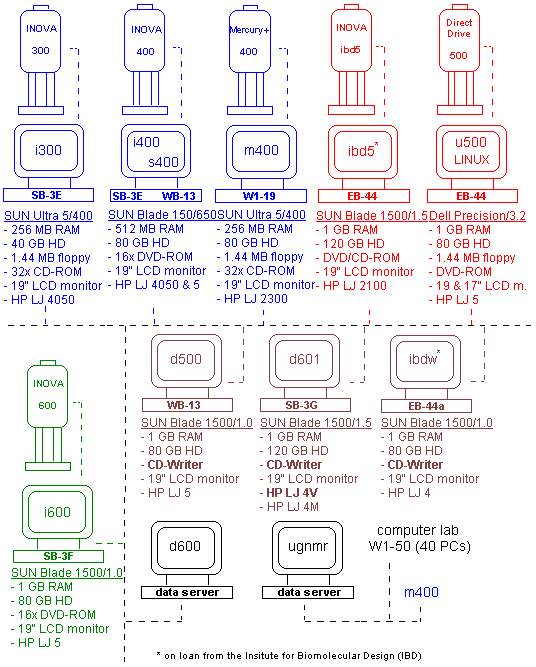Simplify NMR |
|
|
1D and 2D NMR techniques accessible to students/PDFs with at least a minimum desire to learn (minimum ¹ zero!) |
|
|
from acquisition to processing, plotting and saving of data without commands for 7 common solvents and 13 less common ones |
|
|
menu buttons instead of commands (ca. 400 macros, parameter sets and menus implemented) |
|
|
VNMRJ commands and macros and the ability for users to write and use their own macros, parameter sets etc. is retained |
|
|
300, 400 (3x), 500 (2x) and 600 MHz spectrometers: identical operation (VNMRJ and EZ NMR) currently not the case: transition VNMR -> VNMRJ |
|
|
central data storage on d600 (data available on all NMR-related computers) |
|
|
quota system for data storage: no overuse of disk space by other user(s) |
|
|
700 MB CD-Writer on all data stations (d500, d601, ibdw) |
|
|
extensive use of local network to make centrally stored data available on work stations throughout the Department (Linux/UNIX, Mac OS X and Windows; see NMR News 2004-02) |
|
|
flexibility for expansion: hard drives can be added easily to d600 |
|
|
booking of spectrometer time via network (HTML interface) |
This document deals exclusively with Linux/UNIX-based Varian NMR spectrometers which are linked through the local Ethernet network. No information regarding the Bruker 300 MHz spectrometer is included here.
The main objective of this manuscript is to provide information on how to run these spectrometers in a safe and efficient way by using specific menu panels which were set up locally. With the help of these panels, 1D and 2D data can be acquired, processed and plotted without explicitly entering commands. The explanation of general VNMR commands is kept to a minimum as there are excellent manuals located at each spectrometer and data station (in book form and on-line).
Host computers and
data stations
are equipped with the following set of manuals:
During the VNMR -> VNMRJ
transition not all manuals are available everywhere in hardcopy format.
|
|
VNMRJ Command and Parameter Reference (very useful) |
|
|
Getting Started (useful to learn about the system in general) |
|
|
User Guide: Liquids NMR (useful description of common experiments and procedures) |
|
|
VNMR User Programming (useful only if you want to write your own macros and pulse sequences) |
The 7 Varian NMR spectrometers are located in the following rooms:
|
|
one INOVA 300: sub-basement East wing room 3E |
|
|
two INOVA 400: sub-basement East wing room 3E and WB-13 |
|
|
one Mercury+ 400: main floor West wing W1-19 |
|
|
one INOVA 500: basement room EB-44 |
|
|
one INOVA 600: sub-basement East wing room 3F |
|
|
one UNITY 500: basement room EB-44 |
Except for the field strength and the associated spectral dispersion and sensitivity, their operation is essentially identical as they are all equipped with gradients, inverse detection probes or switchable probes and use the same version of the UNIX operating system and VNMR software:
During the VNMR -> VNMRJ transition not all spectrometers operate the same way.
|
|
UNIX: Solaris version 9 and CDE 1.5 |
|
|
VNMR: version 6.1C |
|
|
Linux: Red Hat 4 |
|
|
VNMRJ: version 2.1B |
In addition, there are three SUN workstations with general access and several SGI workstations in individual work groups.
|
|
ibdw (EB-44A), d500 (WB-13) and d601 in the East wing sub-basement room 3G; UNIX and VNMR as on spectrometers |
|
|
Mac OS-X or WinX32 remote: Bergens, Bundle, Campbell, Cowie, Hall, Lowary, Stryker, Tykwinski, Vederas, West research groups |
3. Overview of UNIX-based spectrometers and computers

Figure 3.1: Varian spectrometers and UNIX/LINUX data stations